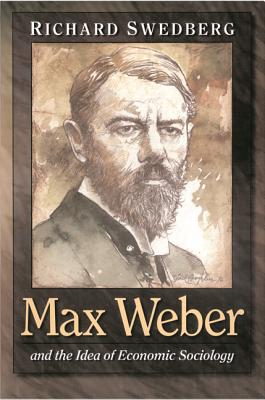

 Princeton University Press
Princeton University Press
Max Weber and the Idea of Economic Sociology


Key Metrics
- Richard Swedberg
- Princeton University Press
- Paperback
- 9780691070131
- 9.19 X 6.1 X 0.81 inches
- 0.97 pounds
- Business & Economics > Economics - Theory
- English
 Secure Transaction
Secure TransactionBook Description
While most people are familiar with The Protestant Ethic and the Spirit of Capitalism, few know that during the last decade of his life Max Weber (1864-1920) also tried to develop a new way of analyzing economic phenomena, which he termed economic sociology. Indeed, this effort occupies the central place in Weber's thought during the years just before his death. Richard Swedberg here offers a critical presentation and the first major study of this fascinating part of Weber's work.
This book shows how Weber laid a solid theoretical foundation for economic sociology and developed a series of new and highly evocative concepts. He not only investigated economic phenomena but also linked them clearly with political, legal, and religious phenomena. Swedberg also demonstrates that Weber's approach to economic sociology addresses a major problem that has haunted economic analysis since the nineteenth century: how to effectively unite an interest-driven type of analysis (popular with economists) with a social one (of course preferred by sociologists). Exploring Weber's views of the economy and how he viewed its relationship to politics, law, and religion, Swedberg furthermore discusses similarities and differences between Weber's economic sociology and present-day thinking on the same topic. In addition, the author shows how economic sociology has recently gained greater credibility as economists and sociologists have begun to collaborate in studying problems of organizations, political structures, social problems, and economic culture more generally. Swedberg's book will be sure to further this new cooperation.
Author Bio
My two main areas of research are economic sociology and social theory. Economic sociology has been a vital interest of mine since the early 1980s; and today I mainly work on current topics. From early on I have also been fascinated by social theory, especially theorizing — what theorizing is and how it can be taught to students through practical exercises. My main work on this topic is The Art of Social Theory (2014). I have also worked on social mechanisms (see Social Mechanisms [1998]; ed. with Peter Hedström).
In the early 1980s I became interested in economic sociology, and I have had the pleasure to help this field grow into one of the major subfields in sociology. My contribution to this has consisted of general works as well as specific studies. For the former, see especially (ed. with Neil Smelser) Handbook of Economic Sociology (1994, 2005) and (ed. with Mark Granovetter) The Sociology of Economic Life (1992, 2001, 2011). For the latter, see e.g. (ed. with Victor Nee) The Economic Sociology of Capitalism (2005), (ed. with Trevor Pinch) Living in a Material World (2008) and (ed. with Hirokazu Miyazaki) The Economy of Hope (2017).
Along the road I have also made a number of studies of the major theoreticians in economic sociology, such as Joseph Schumpeter, Max Weber and Alexis de Tocqueville. The study of Schumpeter is formally a biography, but in reality centered around the relationship of economic theory to economic sociology. The study of Weber attempts to lay a theoretical foundation for economic sociology by following Weber’s leads in Ch.2 of Economy and Society. In my work on Tocqueville my interest in economic sociology comes together with that of theorizing. I emphasize the sociological aspects of Tocqueville’s analysis of the economy, but also how he experimented with different types of data and theories, to make sense of things. See Schumpeter – A Biography (1991), Max Weber and the Idea of Economic Sociology (1994) and Tocqueville's Political Economy (2009).
Besides social theory and economic sociology, I have also written on various other topics — such as the role of civic courage; (with Wendelin Reich) on George Simmel’s metaphors; on Rodin’s statue “The Burghers of Calais”; and (with Trevor Pinch) on Wittgenstein’s visit to Ithaca in 1949. These articles can be found on my webpage.
Today I mainly try to write sociological essays, with an emphasis on new ideas. The topics vary, from traditional ones in social theory to more unorthodox ones, with the same for economic topics.
Education
MM.L. (“Juris kandidat”), Faculty of Law, Stockholm University June 1970;
Ph D, Department of Sociology, Boston College May 1978.
Source: Cornell University
Videos








Community reviews
Write a ReviewNo Community reviews